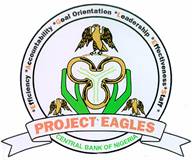Project EAGLES
Project EAGLES overview | Project Impact | IT Initiatives | Project Status Reports: 2006 | Project EAGLES Update
Impacts of Project EAGLES Initiatives
As a result of the faithful implementation of the project EAGLES Change plan, a more professional CBN is beginning to emerge with improvements in operating efficiency and staff productivity in some departments of the Bank.
This has been achieved, despite reduced staff strength, which is based on a rigorous staff deployment exercise and outsourcing of non-core services. From a Bank-wide staff strength of 10,000 staff, excluding the over 2,000 casuals in the HQ and Branches as at 1999 the Bank operates with a substantially reduced staff strength of and 4,914 by December 2005, further down from 6,119 as at December 2004. It should be noted further that 79% of current staff are now professionals.
The Organization structure has also been streamlined, from the old 28 departments, in 1999, down to 23 by 2004 and now further streamlined to 27.
In order to further sustain and enhance its performance, the Bank has instituted well structured and comprehensively planned skills upgrade and training for all staff on redesigned processes and new IT applications.
Consequently, the efficiency index of CBN (measured as ratio of country GDP
to number of CBN staff) has improved from 267 (1999) to 136 (2004) and now 81
though still trailing Malaysia (11),
![]() Botswana (37) and South Africa (4.5)
Botswana (37) and South Africa (4.5)
In order to consolidate and sustain this performance and to ensure continuous improvement towards the our ultimate goal of making CBN one of the best in the world, a framework for measuring and rewarding performance is gradually being established to lay the foundation for a performance management orientation in the Bank. To this end, a 3 tier performance management structure has been approved for implementation. This also entailed the definition of an enterprise scorecard for measuring performance of the Bank based on defined Key Performance Indicators (KPIs) and for all departments and executive staff of the Bank.
There is also a centralised IT Systems and banking database that connects all branches and enables consolidated view of customers' account and one-bank banking. This is based on the deployment of a robust, scalable and secure IT Infrastructure that provides a reliable platform for the business applications and end user computing.
In the same vein, a Balanced Scorecard (BSc) application being implemented to automate the monitoring, measurement and management of performance at the enterprise and departmental levels. The implementation of the HR Self Service and HR Service Centre has equally enabled staff to conduct basic HR transactions such as payslip printing, leave requisition, loan request etc. The Centre-led procurement is increasing value for procurement spend by standardizing cost and product quality, benefiting from volume discount and increased visibility of bank wide inventory
Management has also approved a Code of Business Ethics and Conduct (COBEC) to guide the professional behaviour of staff and ensure adherence to best practices. In addition, there is an ongoing implementation of an enterprise Business Intelligence tool to provide critical information for management decision making.
All these have led to reduced transaction processing costs, increased efficiency and higher levels of automation in the bank as the first set of applications are deployed into the live environment
There is now a high level of awareness of the change initiatives amongst banks and other external stakeholders with increasing understanding and acceptance of the change programme. This has significantly improved the profile of CBN in terms of use of best-in-class technology amongst the banking industry


 Flickr
Flickr Instagram
Instagram LinkedIn
LinkedIn